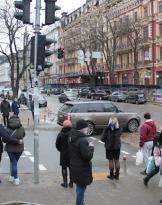Syria is a box with five doors. For now only one remains open: the easier and friendlier one; the one that leads to Beirut. We leave Syria, in the direction of Lebanon.
Syrians consider Lebanon the home garden. It is an idea, perhaps an abuse, perhaps a desire, but in collective iconography it is a common image. We hasty little matter to us, hasty Westerners. Taken from the practical sense, we look at the hills no longer snowy that lead beyond the Bekaa Valley, towards Beirut, towards the sea, towards the return to life.
It's the last day and Bassam accompanies us. He has 54 years and is a driver, often right between Damascus and the Lebanese capital.
Shortly after crossing the border, we stop at a bar along the way. He speaks good English because in his life he has done everything, even the sailor. In fact, of Italy knows more than anything else the great ports.
Bassam has a lot of life experience and knows a lot of things. Today he lives in a suburb of the capital, an area infested by terrorists for years.
When we ask why he never left, the answer is simple and makes us feel stupid.
"If I had gone out, they would have looted me home".
He lived like this for years under the bombs, in the cellar with his family.
From his story emerges a new line of "moderate rebels" (as we call them western sages ...) that we had not yet heard: the Chechens. Cruel and ruthless red-bearded beings. They were just ...
Certainly before the war life had to be simple even for the less affluent: it tells us that with 50 $ you could keep a family with children. Now 200 is not enough. There were no poverty and begging. It was the system Ba'athist.
For Bassam the disaster began with the discovery of the huge gas fields off the Syrian coast.
"What the fuck is this country doing in the middle? It must be eliminated!"They would have said Turkey and Saudi Arabia.
Bassam becomes infused with his own words. It is decided. He knows he represents millions of Syrians who think like him. He continues his reasoning by saying that "the goal is not Assad. They could eliminate it when they wanted to. The goal is Syria itself ..."
Despite everything, he is optimistic "In a few months the war will end".
After drinking coffee, talking without looking at us and with a half smile, he remembers when a journalist asked Saddam Hussein who was the best guide for the Arab world:
"Hafez Assad! - the misunderstood Baghdad would have answered - But I should be a defense minister ...". Saddam was a dictator, but also a wise man of great irony. Bassam talks about the Arab world with a touch of melancholy and regret. As if many things were now lost forever.
He is a tough man, one of those who do not hold back when the country calls.
"I fought in Lebanon in the 84. I was a gunner on a T-55. During the Iraqi invasion of Kuwait, I spent 8 months serving as a reservist in Homs".
We ask why he did not enlist again for today's war. With a pinch of despair he tells us that he did it right away "but they said I was old ..."
He is an experienced soldier. The weapons he saw in the hands of the terrorists surprised him: foreign and technologically advanced weapons.
"If there were no population in the rebel towns, the army could intervene freely. They are still present where I live. A few hundred terrorists hold thousands of people hostage who do not want to let them loot their property"
We ask why nothing can be done. The answer is clear.
"The population reports to the army when and where they gather. Then a bomb arrives ..."
"Syria will be back more beautiful than before!"- continues convinced. "The signal of pacification is the number of investors who are coming to the country. Every day new ones arrive."
As a driver, he is certainly a reliable source for assessing the progress of foreigners arriving, but his words remain halfway between concrete reality and desires.
We ask if Assad, according to him, has not been too long (they think many in the country) before intervening.
"Assad hesitated because it was a clear trap: they would accuse him for any action by invoking human rights".
We have to start again. On the hills between Lebanon and Syria there is a strange crisp air. Some evergreen trees remind us that the Mediterranean is nearby. Instead, it is we who feel distant from the sufferings of Bassam and his people ...
In silence, we take a picture of a coffee cup. He intrigued us questions and replies smiling:
"You have to take the photo for me and publish it. I love my country and I love my president. When some time ago there were the elections and they were marking the finger with the ink at the polling stations, even in an area occupied by the terrorists I went with my whole family to vote. I do not fear them!"
We continue to descend to the west, leaving behind an incredible country silenced by all.
Going away costs us a lot.











